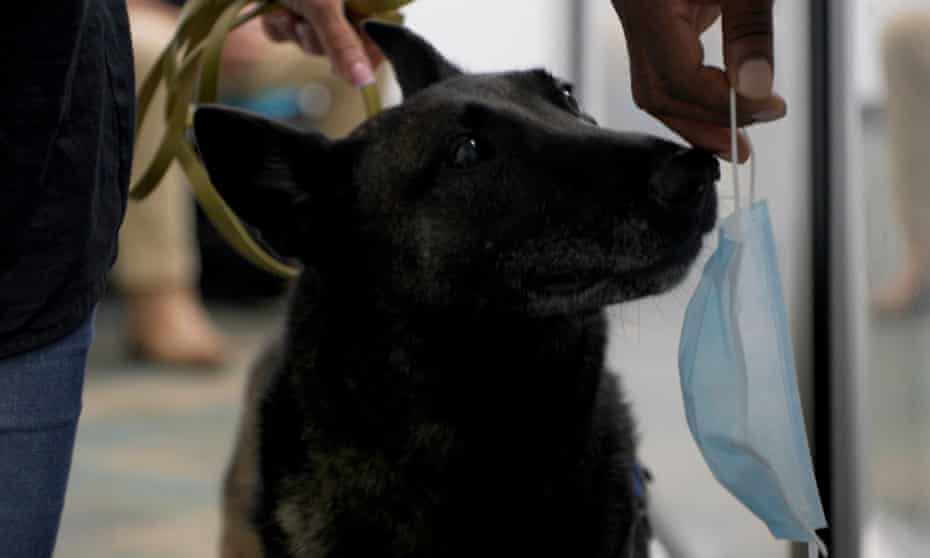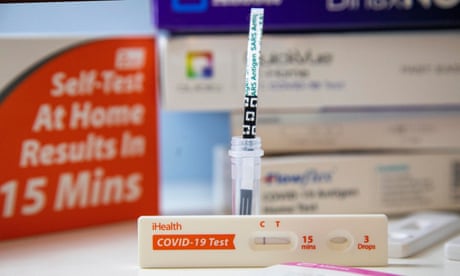Researchers find four dogs can identify biomarkers associated with the virus with 97.5% accuracy

Cobra the dog sniffs a mask, a means of detecting Covid.
Photograph: Florida International University
Adrienne Matei
Wed 12 Jan 2022
Adrienne Matei
Wed 12 Jan 2022
With a sense of smell up to 100,000 times more sensitive than humans’, dogs have been employed in the service of sniffing out everything from contraband to crop molds to cancer.
Yet while researchers first began exploring whether canines could be effective agents in the fight against Covid-19 early in the pandemic, only in recent months have conclusive, peer-reviewed studies begun verifying the hypothesis that dogs know Covid when they smell it.
In late 2021, scientists at Florida International University published a double-blind study of canine Covid detection in which the four participating pups demonstrated a 97.5% accuracy rate in identifying biomarkers associated with Covid-19.
“It’s one of the highest percentages I’ve ever seen, and I’ve been doing this work for over 25 years with all kinds of detector dogs,” says FIU’s Dr Ken Furton, a leading scholar in forensic chemistry specializing in scent detection. “It’s really remarkable.”
Another study from the London School of Hygiene and Tropical Medicine found dogs could identify Covid 82%-94% of the time, whereas recent German research put their success rate at 95%.
Dogs are capable of generalizing odors, meaning they can detect all currently known Covid-19 variants, similar to how they can recognize all manner of explosives when trained, explains Furton.
Yet Omicron has affected search protocols used by the Ohio-based Bio-Detection K9, a company that trained dogs to identify crop diseases prior to the pandemic, and that began providing Covid detection services in October 2020 to clients including Nascar and the rock bands Metallica and Tool.
“Omicron more than any other variant has changed the biology of the infection,” explains the company’s president, Jerry Johnson. Prior to Omicron, Johnson’s team of 14 dogs were trained to approach a line of people and sniff their hands or feet – where humans have many sweat glands – before sitting in front of those they considered infected. Because Omicron is expressed less through the lungs, which transfer the virus throughout the body and into our sweat, and more through the bronchial tube, people must now offer the dogs their worn mask for a sniff.
Johnson’s dogs are able to screen between 200 and 300 people ran hour, and require breaks every 20 minutes to maintain their enthusiasm for the job. When they work with musicians, the dogs are not screening audience members at live shows; rather, they hang out backstage, focusing on a much smaller group of talent, engineers and entourage.

US delivery apps have a new high-end ‘wellness’ product: Covid tests
“This is not a tool that you’re going to use to get 70,000 fans into the Rose Bowl,” says Johnson. “But we can be very effective if you’re trying to maintain a protective bubble.” That efficacy comes at a price; the daily rate for one of Bio-Detection K9’s teams – comprising one dog and its trainer – is $5,000.
Based on his experience with detector dogs, Johnson has a theory that canines are particularly adept at finding viruses because of a biological predisposition towards identifying and avoiding disease among their ranks. The logic is that a wolf in the wild couldn’t care less about cocaine and explosives, or other things we train dogs to find, but would be naturally interested in the health of their pack.
Some institutions are training their own dogs to detect Covid, such as the Freetown-Lakeville regional school district in Massachusetts, which worked with FIU to turn Labradors Huntah and Duke into school safety inspectors last summer.
Dogs are not yet an FDA-approved diagnostic tool, so if they flag someone as infected, that person still must take a Covid-19 test to confirm it. However, some research indicates that dogs may be more sensitive to the virus than PCR tests, identifying infected individuals even before they have amassed sufficient viral load to register on a test.
No comments:
Post a Comment